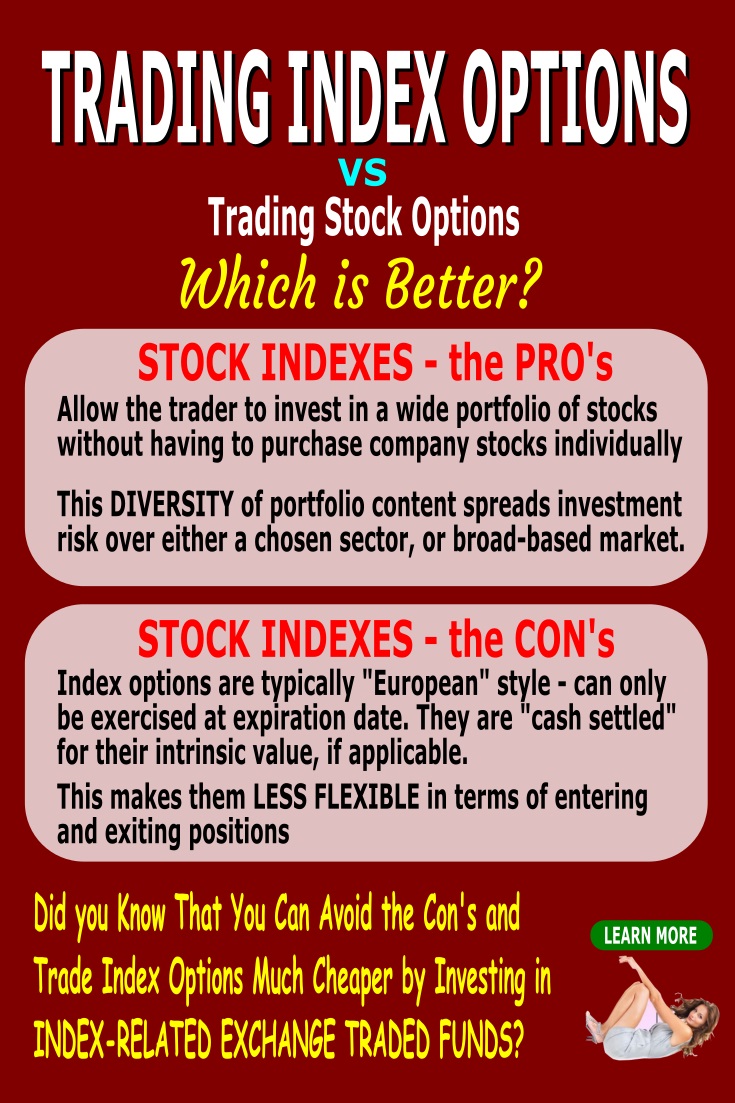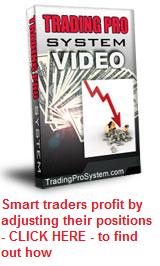Search Options Trading Mastery:
- Home
- Index Options
- Trading Index Options
Trading Index Options for Income
Some Advantages of Trading Index Options Over Stock Options
Trading index options was first made available to investors in 1981. The concept behind trading index options is, that indexes are not comprised of one stock, but multiple company stocks averaged into one "basket" as it were.
Investors and market speculators trade these types of options so that they can gain exposure to the entire stock market or market segments when placing a single trade.
Index option trading allows investors to benefit from diversity in their portfolio without having to buy stocks or futures separately. Holding positions in index options enables trader to keep easy track of what their portfolio is doing since all stocks are combined.
As owning stock in index related funds allows traders to buy and sell their entire portfolio with one transaction, it also means that it`s a lot less expensive in terms of brokerage fees than paying for separate stock transactions.
Trading index options is similar to trading equity options in that they give the investor a predetermined risk and leverage. Index option buyers receive leverage because the premiums that are paid relative to the value of the contract are small.
As a result, when the index moves even a small percentage, the index options investor can realize a large gain percentage for their position. In addition, risk is predetermined since the most that the trader can lose is the premium that has been paid to hold the options.
Calculation
Index options themselves generally have a contract multiplier that is worth $100. Contract multipliers are used to compute the amount of cash value that every index option contract has. Like equity options, the options premiums of indexes are quoted in dollars and cents.
Prices of single equity index options contracts can be easily determined by multiplying quoted premium amounts by the contract multipliers. This calculation allows the index options investor to find out how much needs to be paid to purchase the option, as well as how much money will be received once the option is sold.
Settled in Cash
Since index options are only settled in cash (because there is no underlying asset to deliver), the options holder does not own or have the right to sell the underlying stocks that make up the index. Instead, the index options trader is entitled to receive compensation in cash from the option writer when the option is exercised.
Trading index options is generally less volatile than trading individual stocks on the market. Individual stocks can be affected by takeover rumors, earnings reports and news, as well as other events in the market. For this reason individual stocks can be very volatile.
Index options, on the other hand, tend to be smoothed out by the action of the index as a whole. This helps index options to avoid the wild ups and downs of individual stocks and maintain lower fluctuations.
Reasons Why Trading Index Options is Easy
Trading index options is very popular among options traders, investment firms and hedge funds. Because of this popularity, the volumes that are available to trade are driven up and this reduces the bid/ask spreads quoted in the markets.
Because of this competition, index options investors should always have plenty of volume and fair prices at which to conduct their trades.
Index Related Funds (ETF's) are Better
An even more effective way to access the benefits of indexes, is to take options positions in the Exchange Traded Funds (ETFs) whose entire portfolio consists of a weighted average of the stocks that make up a particular index. Consequently, their stock price fluctuation is directly linked and a reflection of, the movement in the index itself.
Some of the most highly traded and well known stocks in the world are index based ETFs such as the QQQ, the SPY and the DIA. You also receive the added benefits of dividends if you hold these stocks - but unlike index options, they are not settled in cash; you'll end up owning the ETF stock if the options are exercised.
There is a more in depth coverage of index ETFs and how to make the most of them using advanced option strategies in the popular Trading Pro System series of videos.
It's important to distinguish between index options and index futures - although you can also trade options on these futures.
Futures
options cover a wide range of indexes, including currencies such as the
US dollar index. Anyone interested in trading in currencies will find
interesting reading at www.tradeforex.co.uk.
**************** ****************
Return to Index Options Contents Page
Go to Option Trading Homepage















New! Comments
Have your say about what you just read! Leave me a comment in the box below.